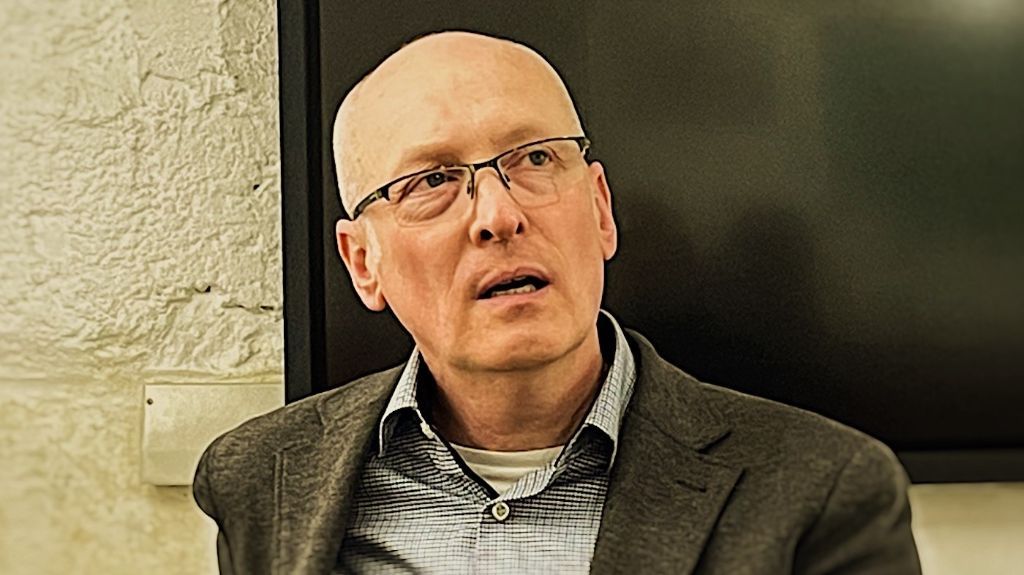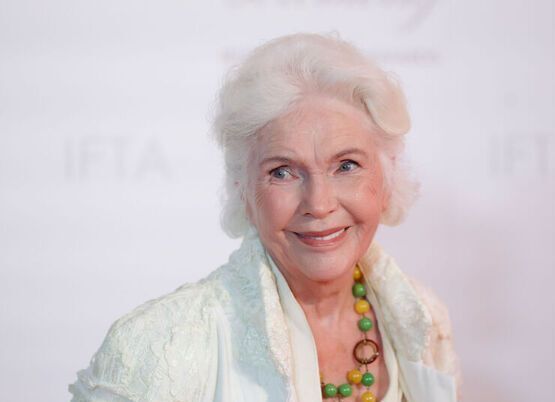Eileen O’Byrne was known sometimes in conversation “to get the wrong end of the stick.” But it was a lucky day for Steven Smyrl that she did the first time they met.
He was researching his father’s Belfast roots in one of Dublin’s main repositories when he got chatting to O’Byrne, a professional genealogist. He commented to her that “that must be an interesting occupation”; she heard instead he was “interested” in a job. In any case, she put him in touch with Paul Gorry, who gave him work as a researcher. It was 1989, and Smyrl was planning a year out from his job as a housing benefits officer for Leeds City Council in Yorkshire.
Gorry, in his introduction to Episode 8 of “Irish GenPod” on SeniorTimes.ie, described him as “most knowledgeable Irish genealogist on the planet.” Smyrl was “shocked” at this description and preferred to admit just to a “wide knowledge.”
Some of his achievements were not contested, however. He’s been an effective campaigner in dealings with governments on the issue of opening up records; he is the author of a groundbreaking book on family records, “Dictionary of Dublin Dissent,” which is subtitled “Dublin’s Protestant Dissenting Meeting Houses, 1660-1920,” and he fronted with his brother on RTÉ the popular TV show “Dead Money” (2012).
When Kit Smyrl also relocated to Dublin from England towards the end of the 1990s, the brothers formed a company, Massey & King (a cobbling together of two family names), that concentrates on probate research, which is undertaken, often on behalf of solicitors, when someone dies intestate without an immediate next of kin.
Steven Smyrl said his brother likes the “puzzle” dimension to genealogy, whereas he was interested in the subject of family history. He can trace that to his parents’ divorce when he was 4, an event that found him living in a household with his mother, grandmother and great-grandmother. When the family photos were taken out, he was curious about relatives who’d died many years before he was born and how the various people were connected to one another.
It was a good start to an eventual career in probate research, a niche area in genealogy he decided would earn him a living. It was a specialty of O’Byrne’s too. Born in 1922, she qualified as a barrister and was called to the bar before she raised her family. In the mid-1960s, she got a job as a genealogical researcher in the Genealogy Office in Dublin Castle. She was a founder member of Accredited Genealogists Ireland, which upon her death in 2016, called her a “very unassuming, generous colleague, while being very knowledgeable about all aspects of genealogical sources and research.”
Many years before, when O’Byrne decided to retire from the work she was doing as a Dublin researcher for a London company, Smyrl took it on in her place
“It’s highly pressurized work,” he said. “You have to be fast. There’s no room for error. You have to be precise in what you’re doing.
“When you say at the end of the search that the deceased’s father had 10 siblings, you have to know that he had 10 siblings, not 11 or 12, and two of them missing,” Smyrl added. “Because people who are descended from those other two might turn up at a later date and all of your work could be questioned.”
The probate researcher must approach a possible long-lost relative of the deceased with some caution. They can’t reveal how much they know because they’re looking for independent verification of family information. If they get it, then a sworn affidavit is signed to the effect that the person wasn’t given leading questions.
Smyrl traveled to Baltinglass, Co. Wicklow, Gorry’s hometown, to be interviewed for “Irish GenPod,” and it proved to be a “trip down memory lane,” as the host reviewed his greatest hits in a career begun at age 22.
There’s his book, “Dictionary of Dublin Dissent,” which he worked on for 18 years before its publication in 2009.
Smyrl, who in the interview said he’s always been a “reasonably committed Christian,” joined a Presbyterian congregation when he went to live in Ireland. He could see from a genealogical point of view that both the Catholic Church and Church of Ireland were well-served with centralized records; but for the Nonconformists, being non-conforming, this wasn’t the case. There were Presbyterians, Salvation Army, Plymouth Brethren, Baptists, Congregationalists, Methodists, Quakers, Moravians, Huguenots, Lutherans and others.
He tracked down records to solicitor’s offices, attics and, in one instance, to the pipes of a disused organ. Sometimes records were in the possession of the grandchildren or other descendants of the last secretary of a congregation before it closed. There was once a Welsh Presbyterian congregation on Talbot Street in Dublin, whose records Smyrl tracked to an office in Anglesey in Wales.
“It’s a phenomenal piece of work,” Gorry said of the book.
But it was for another reason that the podcast host argued that Smyrl will be thanked by posterity: the time he’s devoted to working for the opening up and improvement of information in records.
When Gorry registered his mother’s death in 2006, he encountered for the first time the requirement that the deceased’s date and place of birth and the parents’ names, including the mother’s maiden name, be included on the death record.
Smyrl remembered a conversation with Eileen O’Byrne long ago that epitomized a frequent genealogical conundrum. “Steven,” she told him, “I’ve got five Cornelius Murphys and I don’t know which is the right one!”
The sort of information now required, thanks to Smyrl’s campaigning, will help researchers a great deal in future decades.
The reform had encountered some resistance at government department level in the Republic, but when the idea was advanced for Northern Ireland in 2010, there was little or none. It helped that an official spoke up to say it had worked that way without a problem in Scotland since 1855.
That leaves England and Wales, which are next in his sights.
Smyrl has already been instrumental in the release of the 1939 National Register for England and Wales, which was taken at the end of September, just weeks after the beginning of World War II. There was no stipulation that the register be sealed for a set time, as in the case of census returns, and genealogists had often used it as a source. They had to apply in writing for what they were searching for, but then, at some point, got replies that said there was no requirement to give out such information. And so the successful campaign to change that was started.
Even a campaign lost – to open the 1926 Irish Free State Census returns – had good outcomes. The Cabinet ultimately decided some years ago against an early release, but awareness was raised and plans for digitization were agreed upon. In fact, Gorry writes in the series notes that the very day the episode went live, new details were announced for funding for digitization of the records, which will be released at end of 2026 and early 2027.
Smyrl was in a position to lead such campaigns in part because of his leadership role in organizations and as a liaison officer for a coalition of groups. For decades, Gorry said, the volunteer work done by professionals and amateur enthusiasts was “part of the fabric” of Irish genealogy. The growth of commercialized genealogy, though, with the involvement of international corporations, had been accompanied by the decline in voluntary work.
But not in Smyrl’s case. He is the long-time chairman of the Irish Genealogical Research Society (in 2007, he was named a fellow of the organization and was named a fellow of the London-based Genealogical Research Society in 2019).
He is an active member with Gorry, and several of the podcast’s interview subjects, of Accredited Genealogists Ireland, their professional organization.
In the view of the accredited, the non-accredited can range from the very good to the terrible. Likewise in the era of commercialized genealogy, TV shows can be of varying quality. When approached about doing “Dead Money” – which, in the end, was hastily made to fill a schedule vacancy a few months into the future – Smyrl was able to insist that the story-telling be honestly done, that the series’ six episodes would represent a good snapshot of probate research and they would reflect some degree of the complexity and diversity of Irish life in times past.
Initially shown on RTÉ 2 in the spring of 2012, its excellent viewing figures in an unpromising slot won it a repeat showing on RTÉ 1 at a prime time (see the trailer below).
There wasn’t a second season for personal reasons on the producer’s side; as for the Smyrl brothers, they enjoyed doing it, but the promised two days per week commitment often turned into a full week away from their business.
Which begs the question: could it be scaled up? It might be interesting to see an American or British TV production company take on the “Dead Money” premise: someone in the Irish diaspora leaves behind lots of money, but has not written a will and has no immediate next of kin.
For all eight episodes of Paul Gorry's “Irish GenPod” visit the SeniorTimes.ie homepage. For an article on Episodes 1 and 2, click here.








